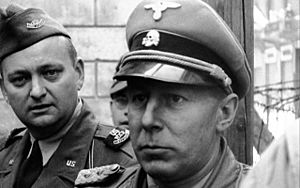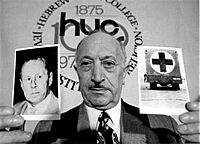Walter Rauff facts for kids
Quick facts for kids
Walter Rauff
|
|
|---|---|

Walter Rauff during his arrest in Italy in 1945
|
|
| Born | 19 June 1906 Köthen, Germany |
| Died | 14 May 1984 (aged 77) Santiago, Chile |
| Allegiance | |
| Service/ |
Bundesnachrichtendienst Dirección de Inteligencia Nacional |
| Rank | SS-Standartenführer (Schutzstaffel) Korvettenkapitän (Kriegsmarine) |
Hermann Julius Walther Rauff (born June 19, 1906 – died May 14, 1984) was a commander in the SS, a powerful organization in Nazi Germany. He worked closely with Reinhard Heydrich in the Security Service, which was a key part of the Nazi government.
After World War II, Rauff worked for the Federal Intelligence Service of West Germany for a few years. He later moved to South America. He arrived in Ecuador in 1949 and lived there for a while.
Rauff was involved in creating Chile's internal security system during its military rule. His funeral in Santiago, Chile, was attended by some former Nazis.
Rauff is known for his role in terrible actions during World War II. He helped develop special mobile units that were used to harm many people. He was arrested in 1945 but managed to escape and was never put on trial.
Contents
Walter Rauff joined the German Navy, called the Kriegsmarine, in 1924 when he was a young cadet. He trained as a midshipman and became a Lieutenant in 1936. He even commanded a ship that cleared mines from the sea.
During his time in the Navy, Rauff became friends with Reinhard Heydrich. Heydrich later became a top leader in the SS, a powerful Nazi group. When Rauff left the Navy in 1937, Heydrich helped him join the SS. Rauff's job was to help prepare the SS for war.
Rauff left the Navy after a problem, but he said he was discharged "with all honors." He returned to the Navy as a volunteer between 1940 and 1941. He commanded a group of mine-sweeping ships in the English Channel. He was promoted again before returning to his work with the SS.
Developing Harmful Technology
In 1941 and 1942, Rauff was involved in creating special vans. These vans were used to kill people the German government considered enemies. This included Jewish people, disabled people, and others.
Rauff gave the job of keeping these vans running to an SS chemist named August Becker. Becker kept Rauff informed about how these terrible operations were going.
Actions in North Africa
Rauff was later involved in actions against Jewish communities in Tunisia during 1942 and 1943. This was when Tunisia was controlled by Vichy France, which supported the Nazis.
A special unit led by Rauff was sent to carry out harsh measures against civilians. However, their mission to harm the Jewish population was stopped when the British army defeated German forces. Rauff's unit still carried out some actions against local Jewish people.
During this time, many Jewish people in Nazi-controlled Tunisia suffered greatly. More than 2,500 Jews died in forced labor camps. Rauff's men also stole valuable items like jewels, silver, and gold from Jewish communities.
Chief of Secret Police in Northern Italy
In 1943, Rauff was sent to Milan, Italy. There, he took charge of all Gestapo and SS operations in northwest Italy. He became known for being very harsh and ruthless.
In both Tunisia and Italy, Rauff was responsible for the executions of Jewish people and local resistance fighters. His work in Italy involved taking full German control of cities like Milan, Turin, and Genoa. His success in this task earned him praise from his SS superiors.
Rauff stayed in Italy until the end of the war. He was arrested by Allied troops and sent to a prisoner of war camp. However, he escaped from an American camp and hid in Italian convents.
Spying Activities After the War
In 1948, Rauff was hired by Syrian intelligence. He went to Damascus and worked as a military adviser to President Husni al-Za'im. They were involved in conflicts against the newly formed country of Israel.
However, Rauff lost favor after a government change in Syria a year later. He was released but told to leave the country. Rauff then fled to Lebanon and later returned to Italy. He eventually got permission to travel to Ecuador, where he and his family settled. They later moved to Chile.
Some reports suggest that Rauff might have worked for Israeli intelligence before the Mossad was officially formed. He reportedly provided information from Syria and was paid for it.
Life in South America
Rauff lived in Quito, Ecuador, until 1958. He worked for several German businesses there.

In 1958, Rauff moved to Chile. He took on two jobs: managing a king crab cannery and working as a merchant. However, he was also brought to Chile by then-Major Augusto Pinochet. Pinochet wanted Rauff to help organize Chile's internal security system. Rauff worked as an "international expert" and advised the Chilean military.
Between 1958 and 1963, Rauff was employed by the Federal Intelligence Service of West Germany (BND). He received money from the agency for his work. To hide his spying activities, he pretended to be an export manager for a company in Chile.
Rauff's reports were not very useful, and he was seen as "untrustworthy." He was dismissed from the BND in 1962. In 1960, Rauff visited Germany to claim his pension from his time in the Navy. He had no problems with German authorities then.
In December 1962, Chilean authorities arrested Rauff after Germany asked for him to be sent back. But he was freed by the Supreme Court of Chile in 1963. The court said his crimes had happened too long ago. Even when Salvador Allende became president of Chile in 1970, the decision was not changed.
After the military took over in Chile in 1973, Rauff became more involved with the new government's security. He advised on creating the secret police, Dirección de Inteligencia Nacional (DINA). Rauff was seen as an expert in dealing with people who disagreed with the government. He helped plan and supervise the building of concentration camps. Rauff was also involved in Operation Condor, a plan to coordinate security operations across South America.
Many requests were made to send Rauff back to Germany or Israel for trial. But Chile's government, led by Pinochet, refused. They said Rauff had been a peaceful citizen for many years. Beate Klarsfeld, a famous Nazi hunter, made the last request in 1983. But it was also rejected.
Death
Walter Rauff died in Santiago, Chile, on May 14, 1984, from a heart attack. He had been suffering from lung cancer. His funeral was attended by some who celebrated Nazi ideas. He never showed any regret for his actions, saying he was just "a mere technical administrator."
See also
 In Spanish: Walter Rauff para niños
In Spanish: Walter Rauff para niños
- List of Nazi Party leaders and officials
- Denazification
- Nuremberg Trials
 | James Van Der Zee |
 | Alma Thomas |
 | Ellis Wilson |
 | Margaret Taylor-Burroughs |

